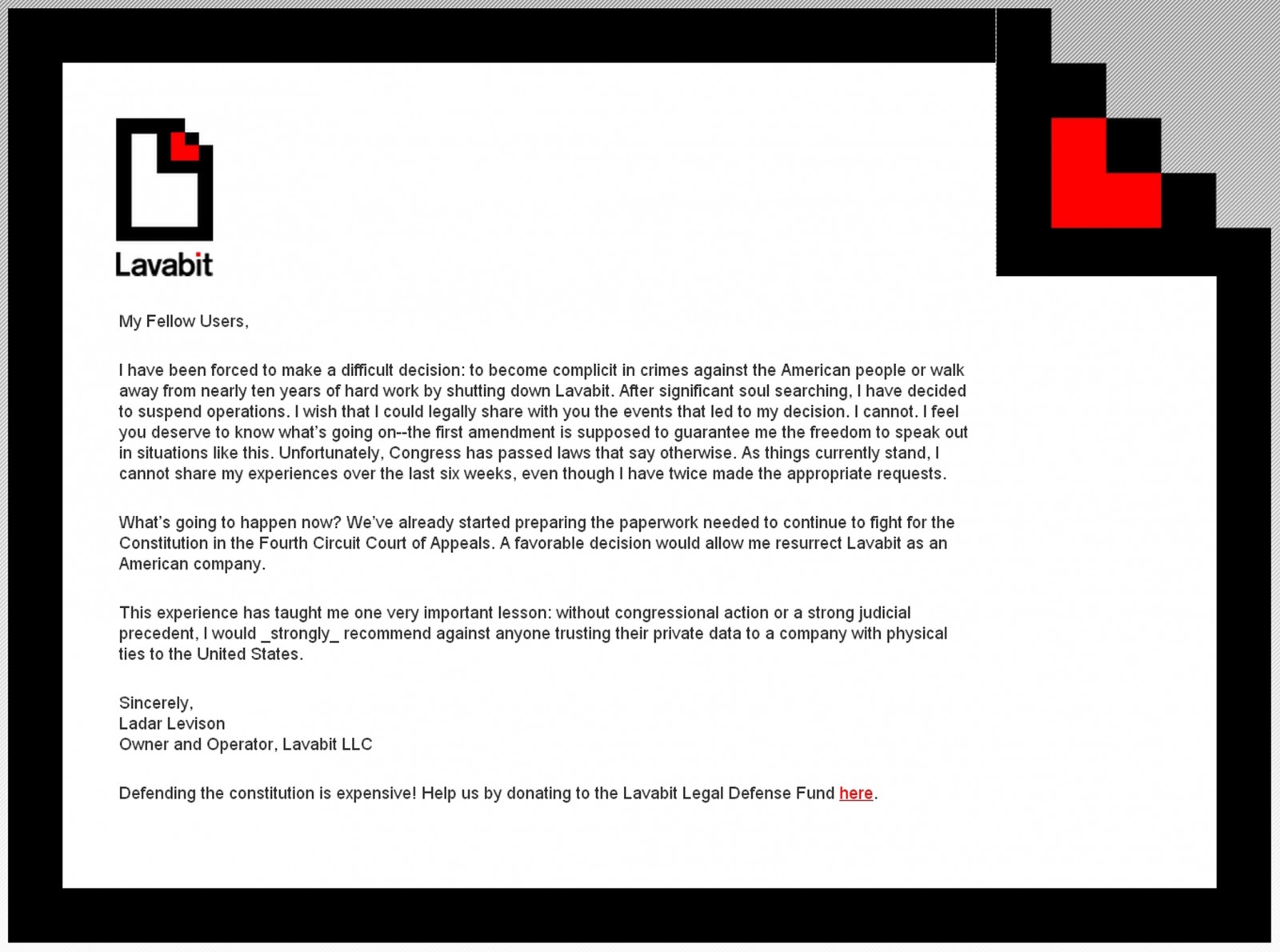
My legal saga started last summer with a knock at the door, behind which stood two federal agents ready to to serve me with a court order requiring the installation of surveillance equipment on my company's network.
My company, Lavabit, provided email services to 410,000 people – including Edward Snowden, according to news reports – and thrived by offering features specifically designed to protect the privacy and security of its customers. I had no choice but to consent to the installation of their device, which would hand the US government access to all of the messages – to and from all of my customers – as they travelled between their email accounts other providers on the Internet.
But that wasn't enough. The federal agents then claimed that their court order required me to surrender my company's private encryption keys, and I balked. What they said they needed were customer passwords – which were sent securely – so that they could access the plain-text versions of messages from customers using my company's encrypted storage feature. (The government would later claim they only made this demand because of my "noncompliance".)
Bothered by what the agents were saying, I informed them that I would first need to read the order they had just delivered – and then consult with an attorney. The feds seemed surprised by my hesitation.
What ensued was a flurry of legal proceedings that would last 38 days, ending not only my startup but also destroying, bit by bit, the very principle upon which I founded it – that we all have a right to personal privacy.
In the first two weeks, I was served legal papers a total of seven times and was in contact with the FBI every other day. (This was the period a prosecutor would later characterize as my "period of silence".) It took a week for me to identify an attorney who could adequately represent me, given the complex technological and legal issues involved – and we were in contact for less than a day when agents served me with a summons ordering me to appear in a Virginia courtroom, over 1,000 miles from my home. Two days later, I was served the first subpoena for the encryption keys.
With such short notice, my first attorney was unable to appear alongside me in court. Because the whole case was under seal, I couldn't even admit to anyone who wasn't an attorney that I needed a lawyer, let alone why. In the days before my appearance, I would spend hours repeating the facts of the case to a dozen attorneys, as I sought someone else that was qualified to represent me. I also discovered that as a third party in a federal criminal indictment, I had no right to counsel. After all, only my property was in jeopardy – not my liberty. Finally, I was forced to choose between appearing alone or facing a bench warrant for my arrest.
In Virginia, the government replaced its encryption key subpoena with a search warrant and a new court date. I retained a small, local law firm before I went back to my home state, which was then forced to assemble a legal strategy and file briefs in just a few short days. The court barred them from consulting outside experts about either the statutes or the technology involved in the case. The court didn't even deliver transcripts of my first appearance to my own lawyers for two months, and forced them to proceed without access to the information they needed.
Then, a federal judge entered an order of contempt against me – without even so much as a hearing.
But the judge created a loophole: without a hearing, I was never given the opportunity to object, let alone make any any substantive defense, to the contempt change. Without any objection (because I wasn't allowed a hearing), the appellate court waived consideration of the substantive questions my case raised – and upheld the contempt charge, on the grounds that I hadn't disputed it in court. Since the US supreme court traditionally declines to review decided on wholly procedural grounds, I will be permanently denied justice.
In the meantime, I had a hard decision to make. I had not devoted 10 years of my life to building Lavabit, only to become complicit in a plan which I felt would have involved the wholesale violation of my customers' right to privacy. Thus with no alternative, the decision was obvious: I had to shut down my company.
The largest technological question we raised in our appeal (which the courts refused to consider) was what constitutes a "search", i.e., whether law enforcement can demand the encryption keys of a business and use those keys to inspect the private communications of every customer, even when the court has only authorized them to access information belonging to specific targets.
The problem here is technological: until any communication has been decrypted and the contents parsed, it is currently impossible for a surveillance device to determine which network connections belong to any given suspect. The government argued that, since the "inspection" of the data was to be carried out by a machine, they were exempt from the normal search-and-seizure protections of the Fourth Amendment.
More importantly for my case, the prosecution also argued that my users had no expectation of privacy, even though the service I provided – encryption – is designed for users' privacy.
If my experience serves any purpose, it is to illustrate what most already know: courts must not be allowed to consider matters of great importance under the shroud of secrecy, lest we find ourselves summarily deprived of meaningful due process. If we allow our government to continue operating in secret, it is only a matter of time before you or a loved one find yourself in a position like I did – standing in a secret courtroom, alone, and without any of the meaningful protections that were always supposed to be the people's defense against an abuse of the state's power.
3 WAYS TO SHOW YOUR SUPPORT
- Log in to post comments

















